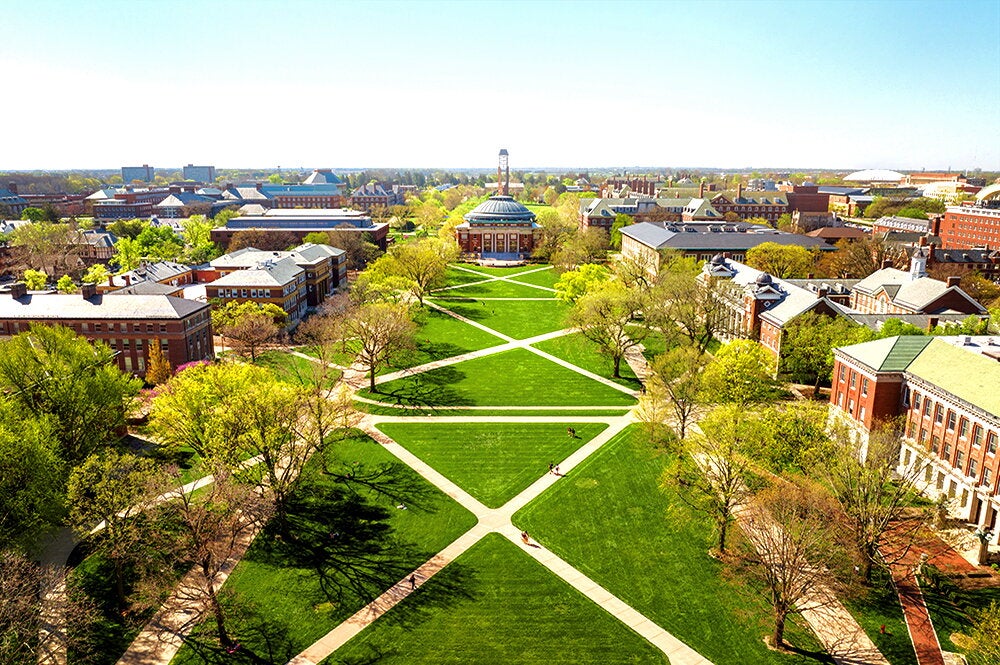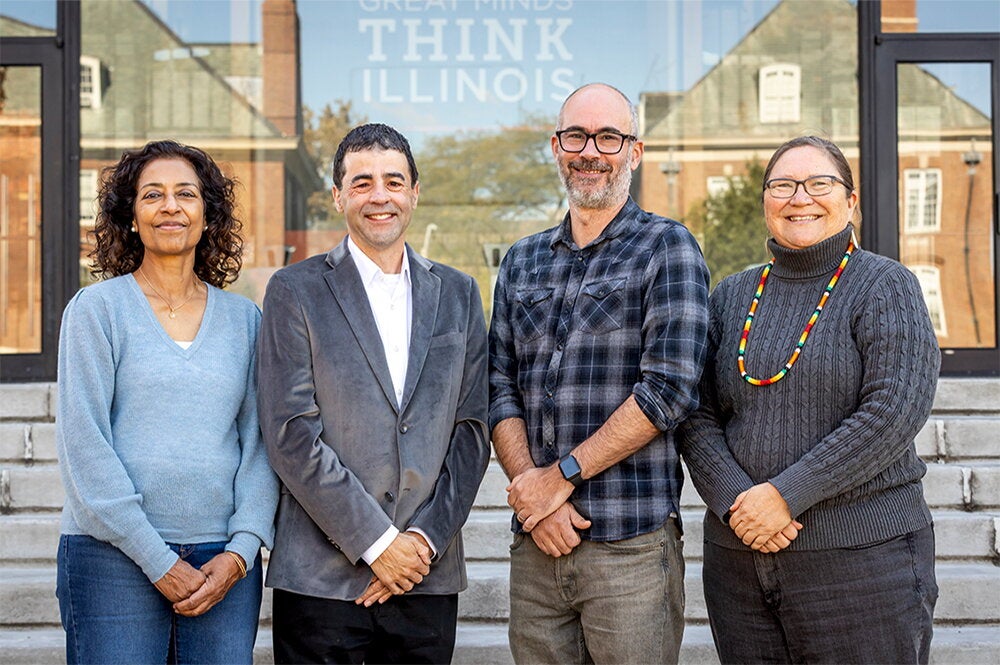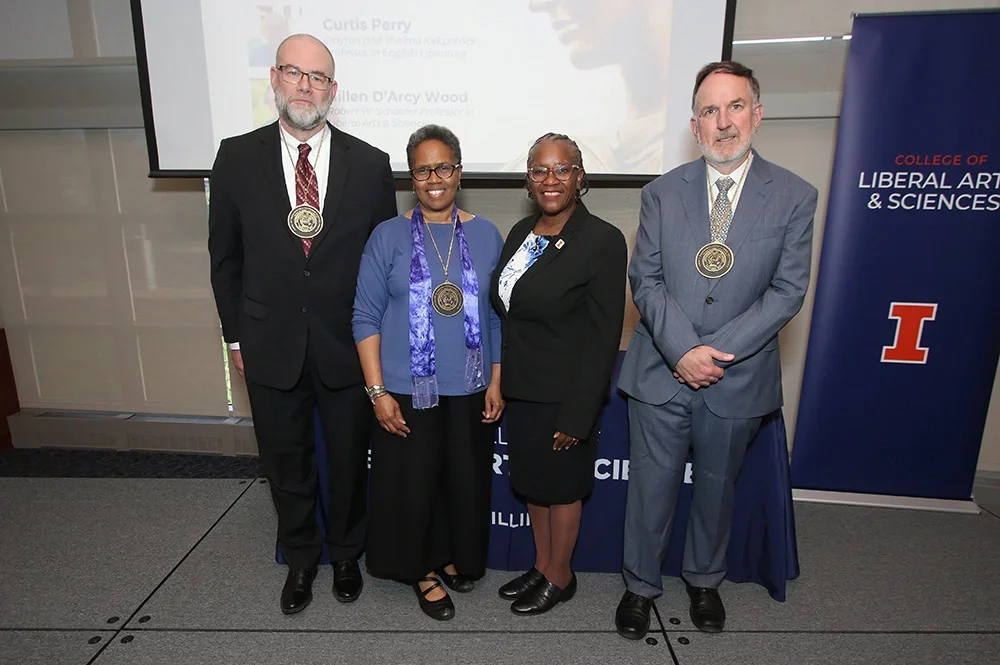
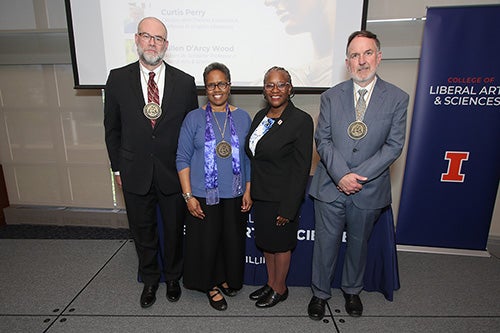
Three English professors were recently honored at the Clayton and Thelma Kirkpatrick and Robert Schaefer investiture ceremony at the Alice Campbell Alumni Center. A crowd of almost 80 people showed up to celebrate the professors’ accomplishments and presence on campus.
Janice H. Harrington and Curtis Perry were named Clayton and Thelma Kirkpatrick Professors in English Literature, and Gillen D’Arcy Wood was named Robert W. Schaefer Professor in Liberal Arts and Sciences.
Clayton Kirkpatrick (BA, ’37, English) spent his life pursuing a career in journalism, moving from Cincinnati to California to Chicago to have a fruitful career with the Chicago Tribune. After marrying Thelma Kirkpatrick in 1943, raising four children, and eventually retiring, the Kirkpatricks established their endowment in 1993 to honor English academics pursuing their own passions.
Robert W. Schaefer (BS, 56’, chemical engineering) was a chemical engineer who was part of the team at Monsanto that introduced the breakthrough Parkinson's disease drug L-Dopa to the marketplace. He supported several causes along with the university, including music, theater, and botanical gardens.
“These ceremonies serve as our most public opportunity to recognize excellence among our own academic family at Illinois,” said Kevin Jackson, vice provost for undergraduate education. “They also act as a reminder that Illinois is a place where hard work is rewarded and scholarly achievement is valued and nurtured.”
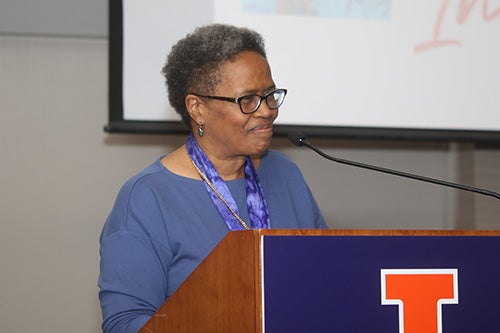
Janice Harrington originally worked as a librarian for the city of Champaign, writing a successful grant amassing $90,000 to provide services at local libraries for Champaign’s growing Latina/o community. She also moved on to be an award-winning storyteller and poet, writing a poetry book titled “Even The Hollow My Body Made is Gone” that eventually led to her position at the university.
Harrington’s peers praised her for her contributions to the field, skillfully combining poetry and history in a way that delights readers. Some of her most recent books such as “Yard Show” uncover stories about the achievements and struggles of groundbreaking Black youth.
English professor Chris Kemp spoke of the unique and profound impact that Harrington had upon her students. They described her “abrupt compassion” and her way of being tender while stern, Kemp said.
“Janice’s work possesses the kind of muscular dignity to adapt to her own interests and commitments one finds in the poised foot of a ballet dancer or the sensuous color rhetorics of abstract expressionism,” Kemp said. “Neither am I indulgent when I say that Janice is one of our great American poets.”
Harrington expressed gratitude to the Kirkpatrick family as well as "the reason her heart beats,” as she referred to her husband, Robert Dale Parker. She described the root of her work, her family, and the space she had to explore writing. Concluding her investiture acceptance, she read from her poem titled, “A Shining Lure.”
“Beside the back porch
A crow hangs a string of meat
From the magnolia’s limb.
Poor garter snake, poor
Ribbon, no longer container
For the reptilian. But still
Your scales shine, still
They school—that we might
(couldn’t we? shouldn’t we?)
By shining lure
Or by the clemency
Of our body’s brief flare
Deny, fend off, or pierce
That coming dark.”
“I hope these small words are enough to thank you,” Harrington said.
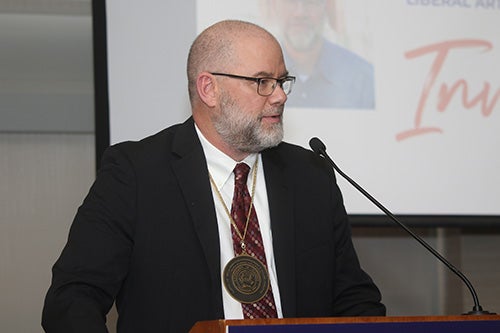
English professor Andrea Stevens spoke on behalf of her colleague and friend Curtis Perry, the other Kirkpatrick Professor honored at the ceremony. Stevens described how they’ve learned much from each other.
“There is something timeless about Curtis. I’ve heard certain actors described as unsuited to perform in a period drama because they have the look of people who have seen cell phones,” Stevens jokingly said. “Curtis has the feel of someone who has perhaps owned a harpsichord.”
Perry thanked the Kirkpatrick family for their generosity and the university for recognizing his dedication before also thanking his colleagues and family members. Searching for the words to describe his emotions, he highlighted that the ceremony was being held on Shakespeare’s birthday.
“When I was a new assistant professor at Arizona State, I would sometimes sit in my hot tub in my back yard in Phoenix in the balmy February air with the smell of orange blossoms and think how odd is it that someone in the late 16th, early 17th century wrote a handful of plays, and for that reason I was picked out of Boston and deposited in this hot tub,” Perry said. “I guess I’m having that feeling again here today. So, thanks Shakespeare.”
Curtis said that this recognition comes after the relentless support of the English department and his wife, Jaya Yodh, who altered her career plans to be with him when he took his first faculty position at Arizona State University. She is now a teaching professor and associate head in the Department of Biomedical and Translational Sciences at Carle Illinois College of Medicine.
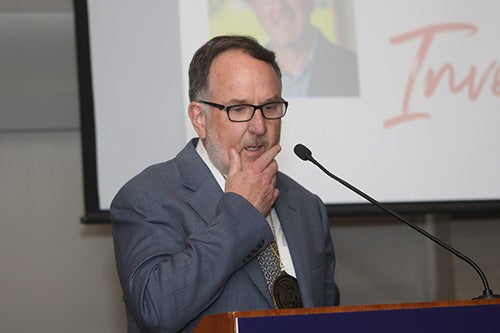
Wood, the Schaeffer Professor, has spent his time at U of I teaching and pursuing environmental writing. Specifically, his research focuses on climate change, history, and the arts. His work has been widely recognized, with his students describing his teaching as so passionate that dry erase markers have flown from his hand while he writes on the white board.
Jamie Jones, professor of English, noted that Wood has written a book every five years since 2001 about an array of passions, from volcanoes to British romanticism.
“This is a blistering way to write, particularly given the kinds of ways Gillen does his research,” Jones said. “He sailed to Antarctica. He climbed to the peak of Mount Tambora in Indonesia. Every five years, Gillen takes an enormous unwieldy research project and he spins it into a living narrative.”
Jones noted that she did some “spy” work to reach out to Wood’s students to hear their account of their experiences with him.
“They [students] said that they don’t think professors take them as seriously as Gillen does,” Jones said. “And it means everything to them.”
Wood thanked not only those who came to support him at the ceremony but also his family members who were virtually attending all the way from Australia, where he is originally from.
He spoke of the need to support international students at the University of Illinois and across the country during the current political climate. He expressed both deep dismay at current events and hope that certain chapters of the history he teaches won’t be repeated.
“It's been my honor these past 25 years to work with and among the poets of the U of I—teachers and students,” Wood said. “Today, this happy event, might only be a brief lull in the storm, but I intend to enjoy it all the same, as I hope you are. Thanks to all for coming to celebrate with us and to celebrate what we do. May we long enjoy the liberty to do just that.”
